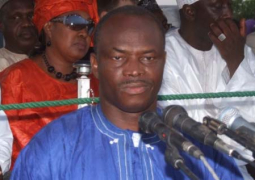This was the second time Solo Bojang was acquitted and discharged by the Brikama Magistrates’ Court.
Delivering the judgment, trial magistrate A.A. Jagne said the accused person was on 9 December 2013 arraigned before the court, on a one-count charge.
The particulars of offence alleged that in 2011 and 2012, at Giramba village, the accused told one Mustapha Gibba that the President was interested in a piece of land situated at the village, which he knew or believed to be false.
The accused pleaded not guilty to the charge, and the prosecution called three witnesses and tendered exhibits. The prosecution witnesses were Mustapha Gibba, Seedy Gibba and Lamin Ceesay.
At the close of the prosecution’s case, the accused person led evidence in his defence, and called one witness.
The magistrate, at this point, spelt out the essential elements of the offence of giving false information to a public servant, which must be established by the prosecution in order to secure a conviction.
For the offence of false information to be established, the prosecution must prove the following: that the accused gave the information to a public officer; the information given by the accused was false at the time of giving the information to the public officer; the accused person knew or believed the information was false; and, the accused intended or knew it would likely cause the public servant to do or omit to do anything, if he knew the facts.
“It is important for me to say that the burden of proving the above ingredients lies on the prosecution,” the magistrate went on, adding that the prosecution could prove this either by direct or circumstantial evidence.
She said in either case the burden must be discharged beyond reasonable doubt.
From the totality of the evidence before her, the magistrate continued, it was her view that the issues for determination in the matter are as follows: whether the accused person gave information to a public officer that he knew or believed to be false; if yes, did the accused intend or knew that it would cause the public servant to omit or do anything which would not have been done, if the public servant knew the facts?
There was nothing before the court that the information the accused gave to the first prosecution witness was false, she declared, adding that the accused person told the first prosecution witness, Gibba, that the President asked him to enquire about the land.
She said going by the Public Service Act, a public officer means a person holding or acting in any public office, and a public office was defined under the same Act as any office in the public service.
The prosecution must prove or lead evidence that the first prosecution witness, Mustapha Gibba, was holding or acting in a public office, the magistrate went on, and pointed out that Gibba told the court that he is a farmer.
“I have not otherwise been able to find any other cogent and compelling evidence, however circumstantial, to lead to the irresistible conclusion that the accused person gave false information to a public servant,” said the magistrate.
“I therefore hold that the prosecution had failed in proving that the accused person gave false information to a public servant.
“It is trite law that where the prosecution fails to prove its case beyond reasonable doubt, the court must proceed with the discharge and acquittal of the accused person”.
She, therefore, acquitted and discharged Lt. colonel Solo Bojang.
Read Other Articles In Article (Archive)
The Effects of Climate Change
Aug 4, 2009, 6:31 AM


